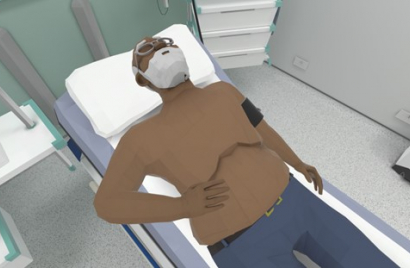
Channel 4’s fact checks the Zuck out of its news
The responsive campaign underlines the role of the news brand as a source of trusted news.

How emotive VR experiences and immersive empathy are changing and deepening how we learn

‘I’ve learned that people will forget what you said, people will forget what you did, but people will never forget how you made them feel’. - Maya Angelou
Whether we’re siloed at work or trapped within social media bubbles, empathy is arguably something we could all do with more of in our screen-dependent lives. But if technology can casually trap us, it can also open a world of possibility and learning. Immersive experiences can help us walk in someone else’s shoes, particularly if they’re grounded and made palpable through emotions. Awe. Sadness. Fear. Loneliness. Anxiety. Confusion. Loss. Joy.
As a creative, I’m always looking for new ways to deliver lasting change and sustained learning – which is why I’m are incredibly excited about the possibility of immersive empathy. Across a variety of sectors, we’re exploring how walking in the shoes of another – or perhaps those of the person we’re going to be – could deliver evocative explorations and unforgettable encounters.
To date, we’ve been using immersive learning and VR to explore prohibitive, complex or dangerous environments. A recording studio. A building site. A submarine. A laboratory. Cost-effective familiarisation with places it’s difficult to access for training or learning in real life. These knowledge-first experiences have proven highly effective – and there are more and more empirical studies to prove their usefulness (*).
But what’s really exciting me is the exploration of experiences which are not designed to learn practical skills or add to intellectual understanding, but which place participants in a novel situation or context to feel what it’s like. Emotion-first experiences. What does it feel like to receive micro-aggressions in the workplace? Or be piloting a plane when your aircraft has a technical problem that can’t be resolved at 20,000ft? Or be the only one in the room when the patient you’re looking after dies in their own home, right in front of you? Through narrative-driven, immersive empathy, we can offer the ability to unfold a real-time, dramatic scenario around an active participant – and create an opportunity to rehearse the most extreme moments of someone’s career before they’ve even happened.
For a recent project, we were asked to develop VR scenarios for trainee Healthcare Assistants (HCAs) in the NHS. After an initial consultation, we realised that after their two-year course, students were unquestionably equipped with the skills, knowledge and confidence to do the job. But, once in the role, the reality of the frontline was translating into an annual exodus – a seismic, ongoing retention issue for the NHS. Unprepared emotionally for the all-too-real pressure of their chosen profession, we realised they needed – as early as possible in their training – to become aware of the emotional context in which they would be applying their skills. And, we knew we could deliver this through immersive empathy.


Just what is it like to experience a shift on A&E, where you’re pulled in so many directions, you don’t know where to care? Or to be on the receiving end of physical and racial abuse from someone with dementia? How would you feel if you were holding the hand of someone slipping away on their lounge carpet after a stroke? Having grilled experts with years of relevant experience, we scripted, designed, produced and rigorously tested three highly emotive, impactful VR experiences. Through these scenarios, students would be able to encounter death, workplace stress and abuse for the first time – and subsequently unpack it all in a safe, educative space.
Clearly, this type of tool lends itself to contexts where emotional resilience needs to be built up and harsh realities ‘pre-lived.’ We also recognise that VR is a way to entice, expand and connect someone to something they need to know – and not the whole learning journey. It won’t replace more traditional forms of education. But as a tool to augment a wider programme of learning, it’s already proving remarkably impactful.
Does immersive empathy give us a new way to rehearse the previously un-rehearsable? To experience another more difficult life, or one wildly different than our own? To unpack, learn from and prepare better for the situations we’re being trained for? Absolutely. And, with exponential advancement in production and design through artificial intelligence, these bespoke experiences are becoming increasingly more affordable, practical and authentic.
As the lead client in our HCA project has already begun to realise – immersive empathy has opened the eyes of her students in a way that appears to be profound and enduring. In her words, the experience is proving to be ‘a game changer’.
Andy has been telling stories through broadcast, film, live events – and now VR – for over twenty years. As a regular drama writer for the BBC, he wrote many plays for the national broadcaster and has won awards for his short film-making. As a Visiting Fellow in Scriptwriting at the University of Salford, he lectured in the UK and across Europe, with many of his students going on to write for film, television and novels. Now a senior creative at Inizio Engage XD, he’s spent the last decade bringing story-telling and art direction to large-scale events, exhibition booths, film and virtual reality projects.
Looks like you need to create a Creativebrief account to perform this action.
Create account Sign inLooks like you need to create a Creativebrief account to perform this action.
Create account Sign in